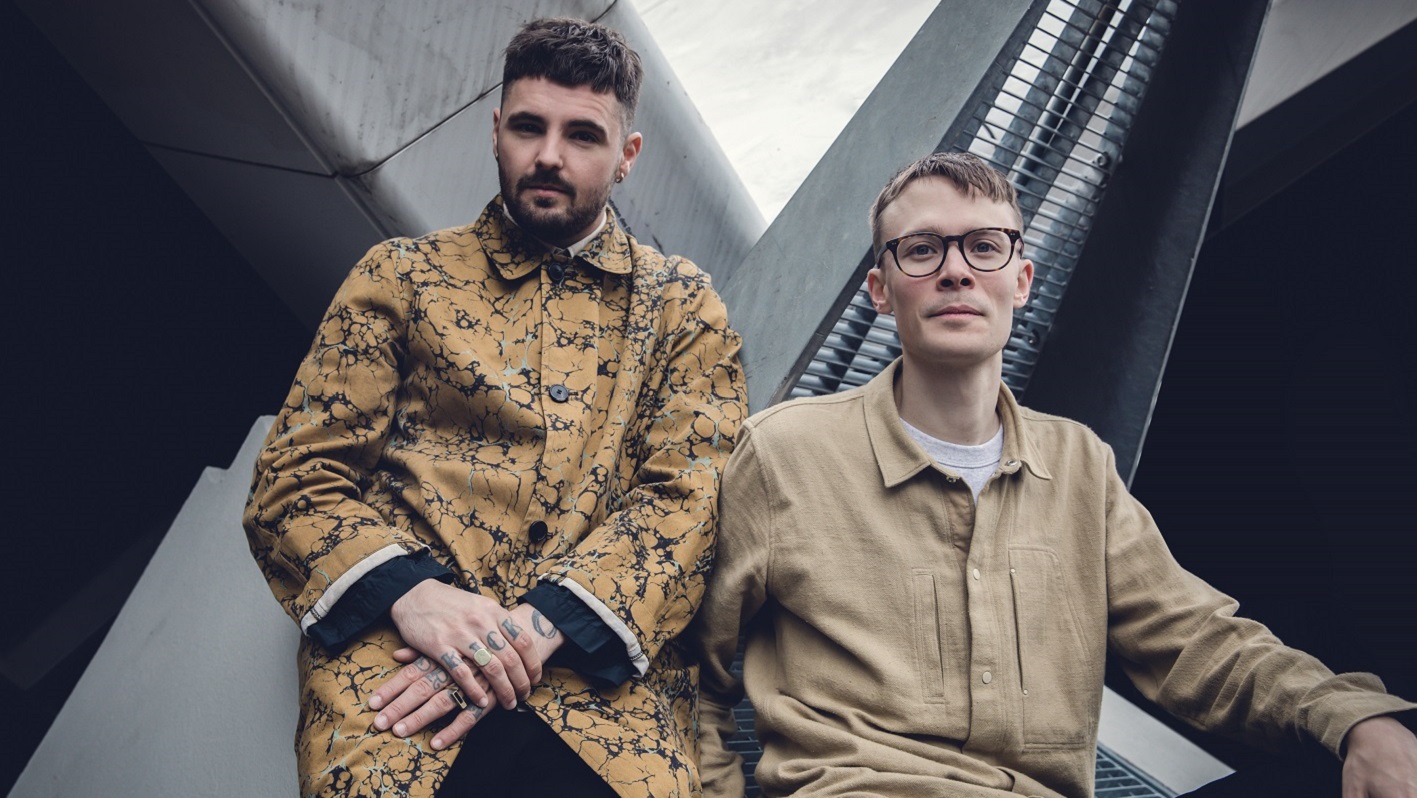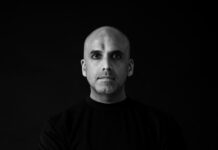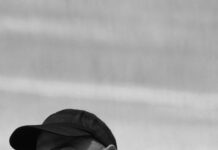Karenn (Alle Fotos: Marie Staggat)
Klickt hier für die deutsche Version des Interviews
Karenn not only inspire with their unfussy, highly energetic yet dark tunes, the two Britons are virtuoso performers and revitalize harsh UK hardware techno from artists like British Murder Boys without looking backwards or chasing trends. After their legendary Boiler Room live set 2014 and EPs for their former label Works The Long Nights Blawan and Pariah took an extensive creative break. In 2019 the two producers reported back with a bang: Two singles and their LP debut Grapefruit Regret were released on the newly founded imprint Voam. The latter in particular was celebrated by the critics and the fans alike and also made it into our best tracks of the year.
Arthur Cayzer alias Pariah and Jamie Roberts alias Blawan are symptomatic for a generation of UK producers who initially gained a foothold in the post-dubstep wave of bass music. Later with their collaboration they grew into an ever more straightforward techno sound. In his Berlin studio Blawan also works tirelessly on solo techno excursions for his label Ternesc. Except for his surprisingly light ambient album Here From Where We Are in the summer of 2018, Pariah hardly appeared as a solo artist.
After their interview in 2013 and our Blawan feature in 2018 GROOVE author Andreas Cevatli met the two before a show at Munich’s Blitz club to discuss Grapefruit Regret, live shows with addictive modulars, bagpipes in the studio and the current state of techno.
Hopefully the grapefruit has been your only regret since recording the album. When did you realize that you’re on to something big?
Pariah: Yes, besides the infamous grapefruit, which gave the record its title, there’s really not much to complain about. Being in the studio has even been the most fun since the first tunes we were making. Basically in 2018 we had a bit of a struggle in the studio. I came to Berlin three or four times back then but I don’t think we’ve been focussed too much. We just threw everything at the wall and looked what stuck there – but nothing really did. This time it felt totally different. Everything fell into place again! It’s almost been like a reset, a fresh start for us which feels really exciting.
Blawan: I think the energy straight up was there because both of us felt we had a purpose for our actions, a reason why we’re here. We knew we were going to scrap the old label and do something new. We got a label name Voam, nice artwork and most importantly a vision music wise. This is why it worked so well. It wasn’t just two guys going in the studio. We had a vision to work towards which enabled us in the recording process. Even the simple things like having a label name can help you creatively. For us at least it did.
Pariah: Also we’re happy to share with you that our next EP is nearly finished!
Blawan: Our album and the general vibe it set also gave us the confidence to ask other people to collaborate and release on Voam. Recent one being Peder Mannerfelt – and we got three records from other people that we’re working on.
You’re known for live performances and improvising on stage. How do you actually approach your shows? You’re basically starting from point zero night after night?
Pariah: Actually less so for the moment since we’re actually using a drum machine rather than processing it all from Jamie’s modular. So there are drum patterns which are recordable and that we can rely on.
Jamie: A huge aspect for us it that there’s no preplanned structure even though it’s not as much of a freefall ride compared to about two years ago.
Pariah: It was definitely a freefall, yeah (laughs) !
Blawan: We just had to change things in our set-up and tighten everything up a little, find a different sound palette. We realized that we needed to do that when we listened back to our own recordings.
„The first three or four shows with a new set-up are always the best ones. You’re just on this edge of kinda messing around and creating happy accidents live on stage.”
Blawan
Pariah: But after a year from now on it will certainly happen again! We’ll listen back to our recordings and fundamentally change gear again. This process is incredibly important for both of us! If you know everything too well you’ll just get bored real quick. It’s just nice to give yourself a surprise from time to time and see how you deal with the unknown and unexpected.
Blawan: The first three or four shows with a new set-up are always the best ones. You’re just on this edge of kinda messing around and creating happy accidents live on stage. Because if you’re using for example a sequencer for eight or nine years you do it with your eyes closed.
That’s why you implemented a modular, Jamie?
Blawan: Most definitely, yes!
Arthur, you can be honest here, has Jamie already tried to convince you to get a modular yourself?
Pariah: Well… (both laughing) No, I’m kidding, he did not! But I have to admit that I personally need instantaneous results or otherwise I’ll lose patience. And sometimes I really wish I had more patience! Because what you can do with a modular, especially the effect sides of it, the filtering and all that – it’s unbelievable! But I might at one point get something myself. But it’s a dangerous thing, I mean, look at Jamie, you can get addicted to it!
Blawan: Oh, come on, man (laughs) ! Seriously though: using a modular there’s just a very, very fine line between creativity and exploration. But the moment you buy an oscilloscope you’re probably not going to ever write music anymore, so be aware of that.

Not only with your instruments, also soundwise you two are quite distinguished. What do you admire each other for the most?
Pariah: Oh, I can answer this! Jamie is the engineer! He just has these engineering skills that I won’t have even in a million years.
Blawan: He’s not giving himself enough credit there. Me for example, I just can’t write melodies. I just can’t do that. And Arthur is really fucking good at that!
Let’s turn this question upside down: Are there moments when you doubt each other?
Blawan: This happens way too often! Mainly though when we’re in the studio. Recently I was trying out some stuff and thought: „Damn, this sounds really interesting!“ Just to look over and seeing Arthur laughing really hard and asking me: „What even is this, man?!“ Only then I realized it didn’t actually sound good at all.
Pariah: I wasn’t even laughing because it sounded bad. It’s just that it sounded a little bit like… bagpipes. In a good way, really!
Blawan: In the studio these things commonly happen!
And on stage?
Blawan: Playing live the way we do is like a question and answer thing. When there’s for example some space in a track and Arthur is filling it with something that is working well, I try to step back a little, bring the volume down or take some notes out and give him some more room. There’s always one person taking the lead at some point and that’s a constant back and forth thing going on between us.
Pariah: I think that is why, when we listen back to our own recordings there are always these moments when it seems like everything is slightly falling apart but then it’s all coming back together as you’re both essentially trying to come up with an idea.
Blawan: But these moments got shorter! There used to be a couple of minutes where both of us were like: „What’s going on?“ There are too many variables. Let’s say one effect is on the channel or the send that we don’t know about – it would fuck everything up. Kind of like holding a presentation that’s set up by a stranger. Arthur and me would have a mental break down. I’d be too scared to even press play. But now this is reduced to some seconds only. It’s all about synergy and experience of playing together.
Pariah: It’s still not perfect. But I think the nature of how we do it can’t ever be perfect. Let’s say you see a really rehearsed live performance, like a band, who just play one track after another. It’s just impossible to get to that level of tightness.
Blawan: And it’s also the complete opposite of what we want to do. I think that’s something that people very much know about us and appreciate. That Arthur and me are basically just coming together and that there’s not much pre-planned – it’s a jam. They know that there’s something really fresh happening which creates this weird energy with the crowd and everyone is feeling the music that way. Even more so when we performed in London a while ago and we played in the middle of the whole crowd. This was incredible. The people could just see that we’re just messing around, turning knobs and all that. When you’re standing on a stage and the closest person to you is 20 metres away from you there will be moments of disconnect.
Pariah: Having a personal sound guy would not even be possible. We’d still need to be there. And it’s also important to us similar how checking the turntables and setting pre-gig is important to someone like Objekt. You might miss out on a dinner before playing but we love to do it. Because in the end it’s our show and we love to put the work in. You have no right to complain publicly if you haven’t bothered to do the bare minimum.
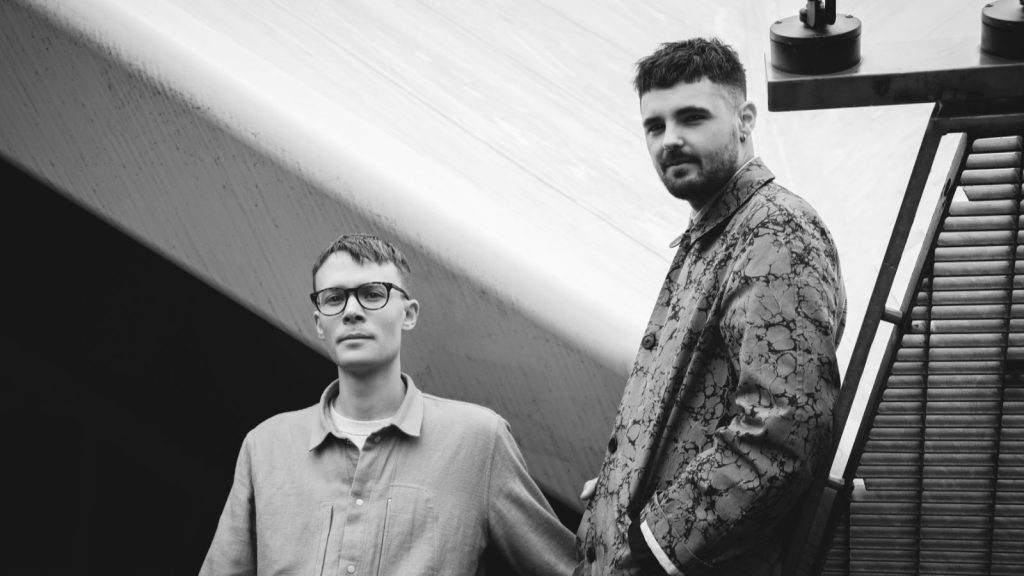
On the one hand you produce nerve-wracking techno, on the other hand you’re just having fun with crazy sounds. How do you bring these worlds together?
Pariah: I think our music is reflecting our personalities. I really don’t want to throw anyone under the bus here, but I feel frustrated with a lot of techno these days, which does nothing for me. It feels way too moody, angry and quite macho.
Blawan: That was also a big focus of the album. Everything from the title to the cover was basically just a big fuck you to what’s going on right now. You sometimes feel so boxed in with this kind of aggressive techno these days. Don’t get me wrong I don’t want to dismiss what people are doing. I actually respect all music and if it works, it works! But since we’re involved in the scene and have to play alongside all that, we just want to show that techno does not have to be like that. It can be hard, it can be fast, it can be fierce, but it doesn’t have to be oppressive! Techno can be whatever you want it to be! We can have a kick drum and a voice layered over it and two minutes later we just do the complete opposite. That’s allowed! It does not have to be a conceptual or formula thing.
Pariah: The weird thing is that we were kind of considered a hard techno act when we started. If you compare that to techno right now, it seems that became the standard.
„Techno can be whatever you want it to be – hard, fast, fierce, but it doesn’t have to be oppressive! If I was eighteen years old and went to a club now I wouldn’t feel included.“
Blawan
Blawan: Like I said I have no problem with any types of music or techno. But there’s so much more to be explored in techno than anger and negativeness. If I was eighteen years old and went to a club now I wouldn’t feel included in some way. It just wouldn’t seem fun enough since everything is really linear. And this sounds like I’m dissing everything, but I’m not. The main issue for me is that techno is not explorative, it packs it into a box and says: „There you go, mate.“ The experimental aspect is gone, it’s techno by numbers. And this is not what it’s about.
Well, it’s normal to care so much because you’re part of the scene.
Pariah: It’s not like listening to the best punk or metal records where you have a cathartic response to it. For me a lot of techno seems like it just wants to sound angry for the sake of sounding angry. Having said all of that though there is also so, so much amazing techno around! There’s a bunch of people that are having an approach that is right on the surface, this element of no fucks given. Giant Swan for example are giving everything a real kick up. So for everything I dislike there’s at least one album or artist I like.
Both of you frequently underline the importance of The Analogue Cops but never got the opportunity to elaborate.
Blawan: Nice, no one ever mentions these guys!
Pariah: With regards to The Analogue Cops and the live jam stuff, that was one of the very first things Jamie and me bonded about musically – hanging out together and thinking: „Oh, these records are just so good.“ Everything from the deep house tracks to this weird kind of noise to more experimental or techno stuff. The crew managed to go all across the board, but also to have this kind of sound to them and link everything together. The ideas coming out of those records for us…
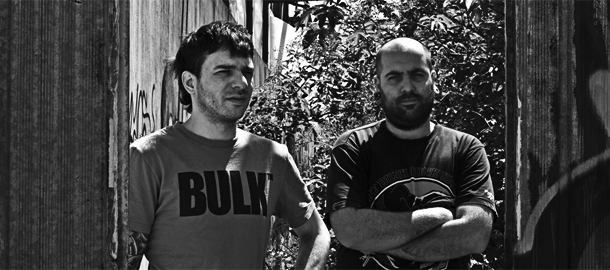
Jamie, 2011 you collaborated with them on Restoration Records und Vae Victis?
Blawan: I first met them in Venice in 2010, when we played together at an after party. My agent at that time who runs Vae Victis casually introduced me to them. They really paved the way for us and especially for me.
Pariah: Remember our EPs on Work The Long Nights from 2012 and 2014? That was all because of them. Each and every track on it was recorded in one take, because they showed us how.
Blawan: I mean at that time we were just in our twenties and met these two punky Italian guys who recorded crazy stuff in their bedrooms, really not giving a shit, throwing it all together at the mixing desk. For us who came from using Ableton, it was just so refreshing to see. You’d write many tracks in an hour whereas before you’d sit in front of your computer, clicking around. This liberated way of writing music changed everything for me. If it wasn’t for these two guys I wouldn’t even know if I’d still be doing music. They made it fun for me again! You’d meet, eat some Pasta and then jam on the machines. It’s also a social thing. And at the end you have like ten tracks. If it’s good, it’s good and if not, then not. For Karenn the recording sessions are a little more focussed, because Arthur and me have a very clear goal that we want to reach, but the Analogue Cops really poisoned our mind! (laughs)
